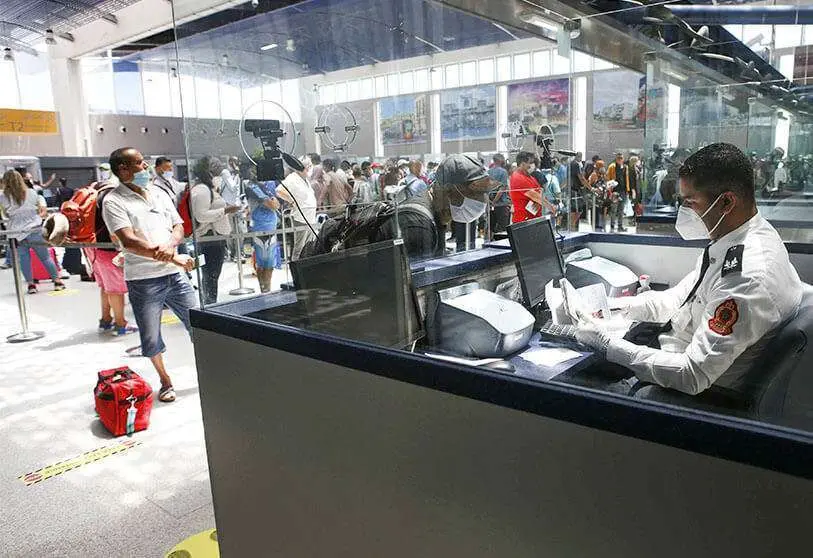Morocco, between drought and health emergency

It's a very difficult year for Morocco. The two emblematic sectors of its economy, namely tourism and agriculture, are at their worst.
Beyond the figures and the official reports, one only has to take a tour of the economic capital, Casablanca, to see the state of affairs.
In fact, it is quite rare to see the economic megalopolis so silent, almost asleep. The usually bustling medina has settled into a slumber and has not yet recovered from the four months of closure and severe confinement. Half of the bazaars are closed, the other half are pretending to work.
Those who stay in front of their shops admit that they have not sold anything for several months. "There are no more tourists, no one comes here anymore. We've never had a situation like this before, it's a disaster," said a carpet salesman. Despite calls from the authorities to maintain physical distance, hospitality prevails here and tea is served and shared without any precautions. No one seems to believe in the dangerousness of the virus and the government's decision to close the borders and ban traffic between cities seems not only exaggerated but completely unjustifiable and even unfair. "We don't know anyone who is sick around us and no one has died," they insist, refusing to wear the mask, which has been mandatory for several months.
The international health crisis has had serious repercussions on the tourism sector. Since March, Royal Air Maroc planes have been on the ground and the extension of the state of emergency until 10 September was the final blow to the industry during the high season.
"Moroccan consumption", say the slogans and other advertising hashtags. But how to save tourism at a time when access to the kingdom's major cities is still banned.
After the head of government announced this new restrictive measure, two days before the big Eid celebrations and only a few hours before its implementation, the Moroccans rushed to get into their cars to go home to their families - racing results, kilometres of traffic jams and some 700 road accidents!
Despite this mess, the Eid celebrations were held. The images captured and broadcast on the social networks of the animal markets, where nobody wore a mask or respected the slightest hygiene measures, shocked public opinion. The number of cases of contamination continues to rise.
After a successful containment that lasted 4 months, Morocco is struggling to organize the next step.
Today, to travel between the different cities of the kingdom, special authorizations "signed by the Pasha" are needed, explains this young woman who had planned to spend her holidays in the Ourika valley south of Marrakech. She spent several days in the town halls and other administrations to get this paper signed without her being able to do so. Finally she gave up.
Royale Air Maroc, which is one of the big losers of this crisis, rushed to communicate about the traffic restriction specifying that air travel was still possible. "In Morocco, when you have money you can do anything, and when you are poor nothing is allowed," said an unemployed young woman. It is really hard to understand the government's decision to ban citizens from traveling in the comfort of their own car or from taking the bus when they are allowed to take planes full to the point of exploding!
This double standard has caused many misunderstandings and has exacerbated inequalities.
In addition to this global health crisis, Morocco is facing another year of drought, which is severely penalizing the agricultural sector, another pillar of its economy.
The Minister of Agriculture and the famous businessman Aziz Akhennouch announced a few months ago that the rate of filling of the dams had already dropped considerably. Agriculture, which contributes 14% to GDP, is in a very difficult situation. Rain "has a deficit of 44% compared to a normal year," the minister announced.
This decline has led to the overexploitation of the water tables, which are threatening to dry up. Morocco is currently under hydraulic tension.
The High Commission of Planning (HCP) announces a retraction of growth. Instead of 3.5% initially planned, it will be 2% this year.
In a statement made to AFP, the president of the HCP, Ahmed Lahlimi, confirmed the fall: "In 2019, we had recorded a fall in agricultural added value from 3 to 4%. This year, it will probably be around 5%.
For his part, the Minister of Agriculture had announced a broad support plan following "the evolution of the situation", but nothing has been announced for the moment.
Last April one of the biggest events combining tourism and agriculture.
The International Exhibition of Agriculture in Morocco has been cancelled, which is a new blow to the sector.
The finance law for 2020, which had foreseen a production of seven million tons of cereals, should revise its projections downwards and take into account the reality on the ground, since according to millers, half of this year's harvest is expected.

